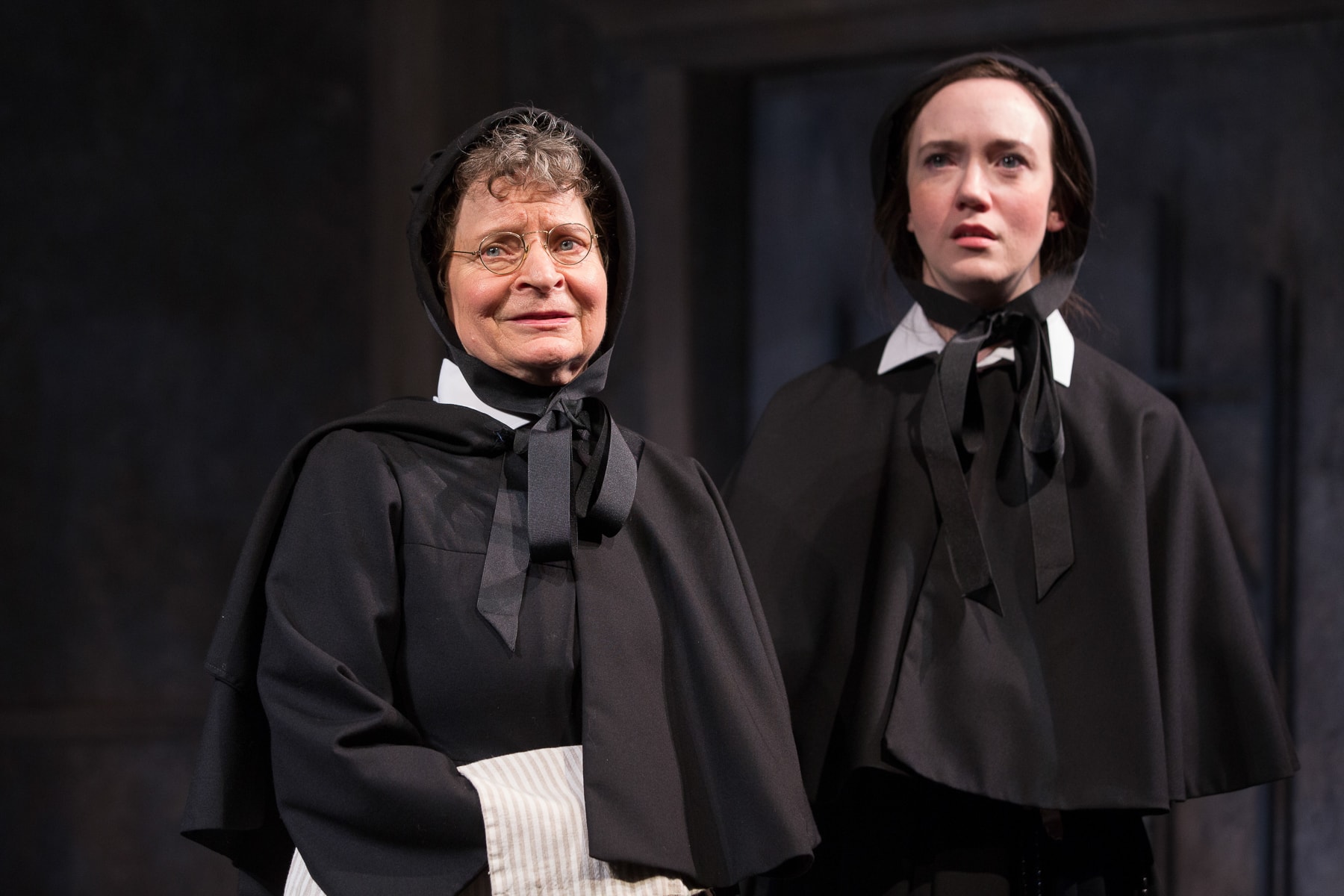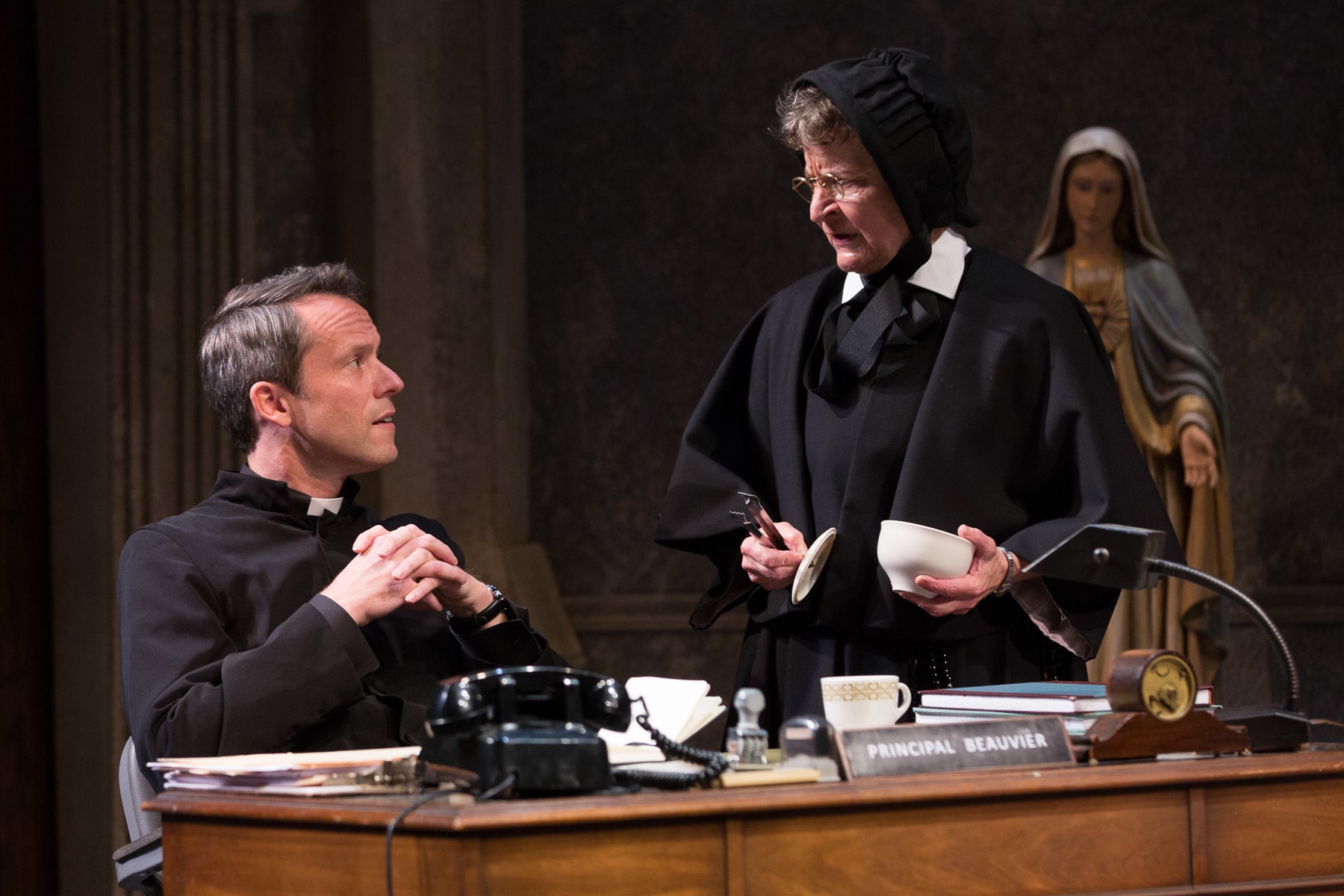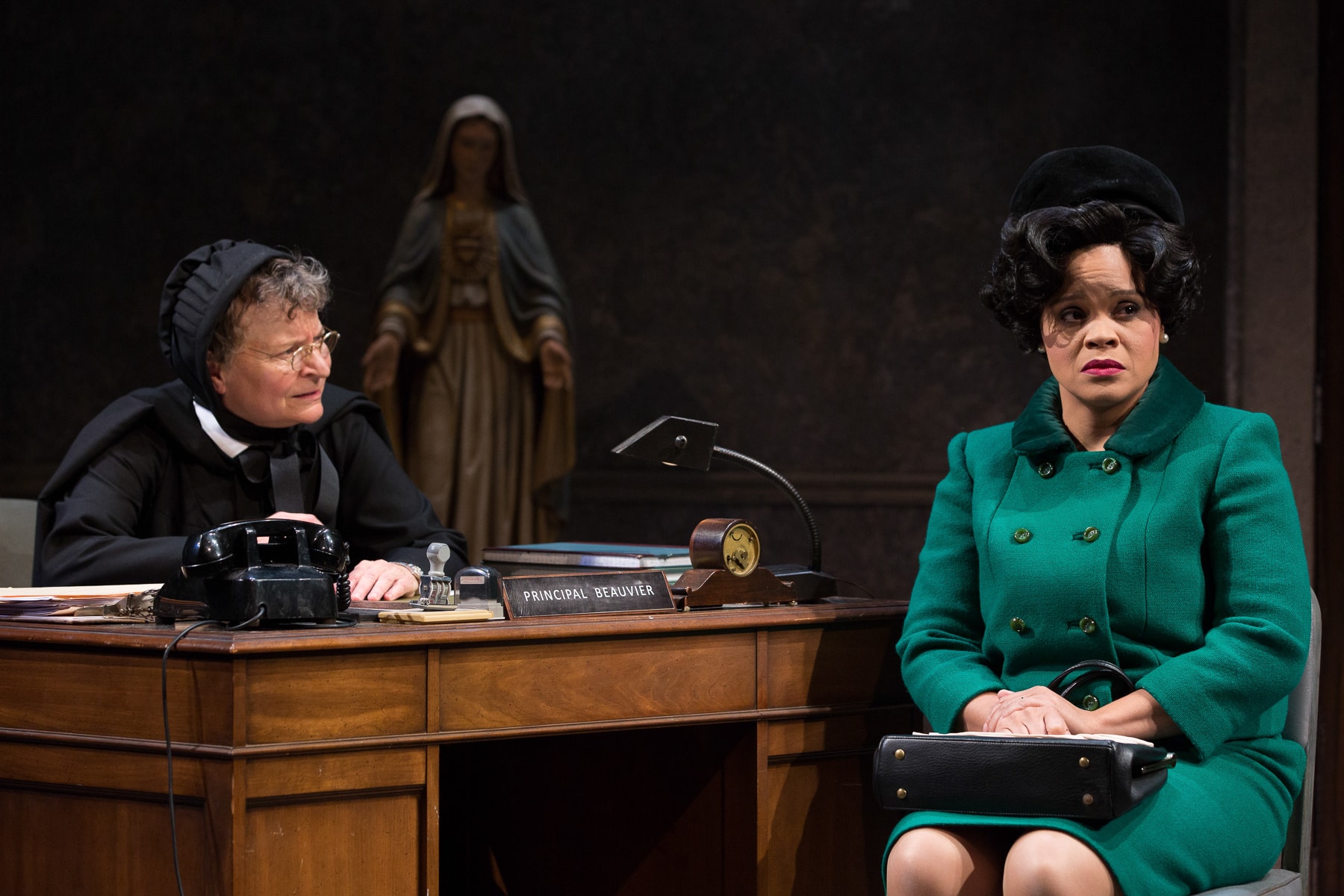In 2003, John Patrick Shanley started writing a play about an America full of opinionated people, people who were certain they were right, people who shunned intellectual debate. From Shanley’s point of view, behind all that certainty there was a crack “and that crack was doubt.” Eventually, that play became Doubt: A Parable, which eventually won a Tony and a Pulitzer Prize.

Now Studio Theatre is offering Doubt in a compelling production that shows off its significant central arguments — about faith, tradition, ambiguity, suspicion, and the power of love, to name just a few.
Shanley set Doubt in 1964, two years after the Second Vatican Council brought sweeping changes to the Catholic Church, amid all the social and political havoc that erupted from the Civil Rights Movement, the sexual revolution, and the assassination of John F. Kennedy.
Seen against that backdrop, the warring characters of Doubt almost seem fated to exist at the fictional St. Nicholas Church and School in the Bronx, New York. At one extreme, there is the stern, conservative school principal, Sister Aloysius, an aging nun who is brusque and cares only for power. At the opposite extreme is an innocent young teacher, Sister James, who loves teaching and makes the mistake of telling Sister Aloysius so. Aloysius responds with a harsh lecture.
The third character in Doubt is Father Brendan Flynn, a modern-thinking, liberal, charismatic priest who represents a desire to bring the Catholic Church into the modern age. It is inevitable that he and the retrograde Aloysius will clash. Ultimately, Sister Aloysius seems to broker that clash when she hears from Sister James that the school’s first Black student, Donald Muller, may have been drinking altar wine.
Aloysius summons Flynn, questions him about his relationship with Muller, and implies that she believes he may have done more than given the child wine. She threatens to call Flynn’s previous parishes in order to find out if she can dig up any proof – or suggestion – of Flynn’s earlier inappropriate relationships with students.

Into this tight-knit group comes one final character, who is one of Shanley’s most finely drawn personalities: Mrs. Muller, Donald’s mother. From her perspective, the only thing that matters is that her son make it through the year, so he can move on to high school. His father beats him at home, he couldn’t survive in the public school, so Mrs. Muller begs Sister Aloysius to overlook anything else that may be going on, just to give Donald a chance at advancement.
Doubt contains the end of two sermons by Father Flynn, both of them touching on issues that are highlighted in the play. In the first, Christian Conn as Flynn speaks directly to the issue of hopelessness that many sense when they feel that they have to survive tragedies alone. He speaks to the lone man or woman feeling a secret alienation but also suggests that the doubt many people feel may create a “bond as strong as certainty.” Flynn’s second sermon, after he has been confronted by Aloysius, is a beautifully constructed riff on gossip. Whether he is arguing with Aloysius, consoling James, coaching his boys in basketball or addressing his flock, Conn consistently strikes the right tone.
In an early scene, Sister Aloysius (Sarah Marshall) lets fly her personal philosophy, which she haughtily expects everyone to share. When Sister James (Amelia Pedlow) enters, Aloysius asks where her students are. James answers: “Art.” “Waste of time,” snaps Aloysius. Marshall pours on the resentment a little too heavily at the start of the show, leaving no room for emotional crescendo. Fortunately, Marshall tones down her vitriol by the play’s middle, so that there is room for her to maneuver into the play’s very moving ending.
Pedlow’s sweetness and desire to be a worthy teacher help the production. It is impossible to side with Aloysius after seeing how shabbily she treats her staff and her students. Pedlow’s instinctive desire to be useful and helpful throws into stark relief Aloysius’ nasty attitude to everyone around her.
The final character in Doubt, Mrs. Muller, is played with worldly-wise resignation by Tiffany M. Thompson. As she explains to Sister Aloysius why it is important for her son to graduate, it becomes clear that she comes from a different and more pernicious world than the one the other characters live in. Thompson makes the trumped-up charge of drinking altar wine seem like child’s play compared to the trials her son faces in the real world. It is a breathtakingly harsh look at how some people survived their lives in the Bronx in 1964.

There is more conversation than physical movement in Doubt, but director Matt Torney keeps the action moving at a brisk pace throughout. Set designer Daniel Conway divides a sextagonal thrust stage in half. In the rear are the gray stone walls of the school’s interior and a small garden outside it. Very little adorns the walls, just a sculpture of the Virgin Mary. For exterior scenes, there is a garden bench. For Aloysius’ office, there is a heavy wooden desk and several chairs.
Costume designer Wade Laboissonniere dresses Sisters Aloysius and James in black habits with short capes, black bonnets, and heavy silver crosses at their waists. Flynn wears a loose-fitting black cassock. His brightly colored vestments during his sermons (green and gold; blue and white) set him apart from the normal world as surely as does the plumage of a bird-of-paradise.
Doubt: A Parable is a durable tale, as relevant now as it was when it was written. Studio’s production artfully demonstrates Shanley’s ability to pull away the layers with which his characters cover themselves. As Aloysius tries to fire Flynn for wanting to give his boys ice cream and take them camping, the audience is forced to reflect on what it finally knows about the truth. Shanley doesn’t give any answers. He is just great at asking questions.
Running Time: One hour and 35 minutes, with no intermission.
Doubt: A Parable plays through October 20, 2019, at Studio Theatre, 1501 14th Street NW, Washington, DC. For tickets, call 202-332-3300 or go online.
Dawn Chiang, Lighting Designer; Victoria Deiorio, Sound Designer; Lauren Halvorsen, Dramaturg; Zach Campion, Dialect Coach; Lauren Pekel, Stage Manager




